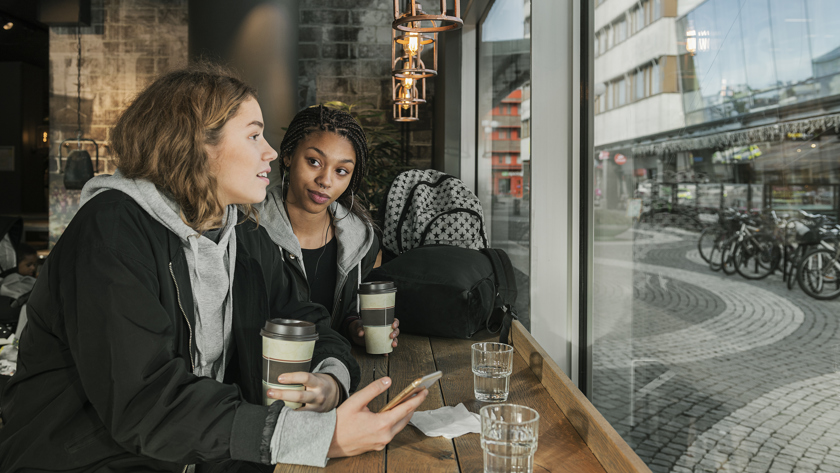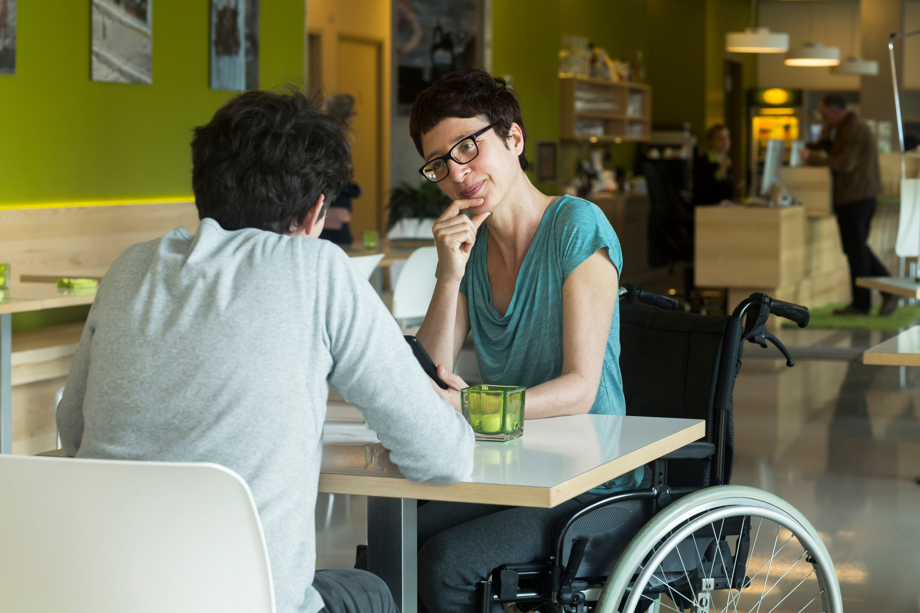
Information for relatives
Honour-based violence and oppression rarely affects just one person in a family or other similar group. Honour permeates every feature of life, and thus affects all members of the group in some way.
Protecting children around you
As a parent or close relative, you have a responsibility to look after the children around you. No one should force or pressure a child or young adult to get married. Nor is it legal for an adult to allow a child to get married.
In Sweden, children are not allowed to marry, regardless of whether or not they want to. This is a crime called child marriage crime. It is also illegal to force an adult to get married against their will. This crime is called forced marriage. No one is allowed to take a child or an adult abroad to be married off. This is a crime called deception for the purpose of marriage abroad.
Female genital mutilation is also banned in Sweden. Nor is it permitted to take a child abroad to perform genital mutilation on the child.
Since 1 June 2022, the law has included honour-based oppression as a new criminal offence. The new offence means that systematic violations can be punished as honour oppression if the acts have been committed with an honour motive.
If you are a relative of a child or a young person who you suspect is a victim of – or at risk of – honour-based violence or oppression, there are things you can do to help and support them. The law is on your side. Talk to someone at social services or the police, for example, and ask for help.
Talking with children and young people
It may feel hard talking to a child or a young person if you suspect that they are a victim of honour-based violence and oppression. But it is important that, as an adult, you have the courage to ask questions and to listen when children and young people try to tell you about these issues. Below are some things to keep in mind when talking with children and young people.
- Ask open questions.
- Listen to the answers.
- Take the child’s or the young person’s story as a starting point.
- Have the courage to stand by them and provide support, no matter what you hear.
Show the child that you are listening by adapting your language in line with the child’s use of language, especially when it comes to sexuality, identity and gender. For example, you should use the pronoun that the child uses when referring to themselves. This can make it easier for the child to open up and dare to tell you.
Questions that may be useful to ask if you suspect honour-based violence and oppression include:
- Is there anything you aren’t allowed to do that you want to do?
- Is there anything you have to do that you don’t want to do?
Ask follow-up questions that help the child or young person to talk about their situation.
Important things to remember
Remember not to pressure the person to talk if they don’t want to. If the child or young person feels pressured, they may stop talking altogether.

You can provide support
Children and young people living in an honour context are in a very vulnerable situation. As children, they are dependent on their family, especially their parents or guardians. If a child is subjected to violence or oppression at home, they may have to move away and break off contact with their family, at least for a while. As a family member, you can be an important source of support for the child or young person.
Immediately after a vulnerable child has left the home where they were at risk of violence, they may need peace and quiet. However, after a while, it is common for their longing and need for their family to take over. It is important that the child or young person only sees someone from the family if this can be arranged safely. For example, a meeting between the family and the person at risk must not reveal where they are currently living, as this would lead to a risk of renewed vulnerability.
Social services can help when a vulnerable person wants to meet their family, but it is not always possible to arrange this in accordance with the wishes of the child or the young person. While they are unable to see their immediate family, you, as a family member, can be an important source of support for them.

Things to think about
If you suspect that a child or a young adult close to you may be a victim of honour-based violence or oppression, it worth telling them that you have noticed things about them that suggest they may be unhappy. Ask how they feel, and tell them that you are concerned because you have noticed that they seem to be unhappy.
It is important to build trust, and to gain the confidence of the child or young person. You can do this by listening and being there for them. As an adult, you may need to take action to protect the child, for example by reporting a concern to social services.
Avoid creating your own picture of the child or young person’s situation. Let them tell their story themselves, in their own words and at their own pace. Don’t jump to conclusions about how the child might feel or evaluate the information you hear. Always take the child’s story and what they say about their feelings as your starting point.
Show that you are willing and able to listen to what the child or young person has to say, and don’t try to find a quick solution to the problem. It’s important that the person telling the story feels they are being listened to, and that you – the listener – understand and are able to deal with what you hear. Finding a solution to help the victim comes later.
Summarise what you have heard and ask whether you have understood correctly. Only then, when you have a common understanding of the situation, can you move on to talk about what to do next. Remember that it is important for the child or young person to be involved and informed about what is happening, for example if you report a concern to social services.
Offer to go with the child or young person if they want to contact a support service. You can find a list of support services at the bottom of this page.

Film about honour-based violence and oppression (in Swedish)
Devin Rexvid is a senior lecturer and researcher at Stockholm University. In this film, he explains what honour-based violence and oppression is, what it can consist of, and what violence and oppression can look like. He also explains what support and help is available for victims.
Support services
There are a number of support services with experience and knowledge of honour-based violence and oppression. Below is a list of some of the services that victims can be referred to for the support and help they need. Many of these services are also available to family members or friends of victims.
The Swedish Police Authority
The police receive reports of crimes and then investigate the reported crimes. They can also refer you to other services if you need someone to talk to about what you have experienced. If you are threatened or subjected to violence, the police can offer you protection.
Social services
The social services in each municipality are responsible for providing help and support to victims of crime and their families. Below is a link to the website of the Swedish Association of Local Authorities and Regions, which has contact details for your municipality.
Victim Support Sweden
Victim Support Sweden is a voluntary organisation that supports victims of all types of crimes.
GAPF Support Line
The national association Glöm Aldrig Pela och Fadime (‘Never Forget Pela and Fadime’, GAPF) offers support and advice via its support line. It is open 24 hours a day, every day of the week, all year round. Victims, relatives and professionals can contact the support line for help. The support line is staffed by people with experience of dealing with those who are restricted by honour norms. Calls are free, you can remain anonymous, and support staff have a duty of confidentiality.
Linnamottagningen
Linnamottagningen is a centre for young people who have been victims of honour-based violence and oppression, or who have been married off or are at risk of being married off against their will. The centre can provide both emergency and long-term help. The centre has expertise in LGBTQI and cultural issues, and can also provide advice to professionals who come into contact with victims. The centre has a national hotline.
The "Love is free" support chat service
Save the Children Sweden operates a support chat service called ‘Kärleken är fri’ (‘Love is Free’). The service is run by volunteers, for children and young people who need support and advice on a wide range of honour-based issues. Children and young people can ask questions about rights, honour-based violence and oppression, restrictions and forced marriage, among other issues.
RFSL Support Service
The Support Service operated by the Swedish Federation for Lesbian, Gay, Bisexual, Transgender, Queer and Intersex Rights (RFSL) provides support for LGBTQ people who have been subjected to harassment, threats or violence. Relatives and friends of LGBTQ people who are victims of violence and professionals who come into contact with the target group can also get in touch. Calls to the support centre are free, and can be made anonymously.
Somaya women's shelter and young women's shelter
Somaya women’s shelter and young women’s shelter is a non-profit organisation that supports girls, women and LGBTQI people with a foreign background who are victims of intimate partner violence or who live in an honour context. Somaya’s operations are multilingual and include a support line, a support chat service, sheltered accommodation and an activity centre. The staff have extensive experience of helping people who need protection or to escape from violence and oppression.
Terrafem
Terrafem is a non-profit organisation that works to ensure girls and women have the right to live their lives free from men’s violence. Terrafem operates a national hotline for girls and women of foreign origin, and has contact with victims from different countries and in different languages. Terrafem also operates a legal hotline and a women’s helpline.
Tjejers Rätt i Samhället ("Girls' Rights in Society"), TRIS
TRIS is a non-profit organisation that works to combat honour-based violence and oppression. TRIS offers help to adults, children and young people who are subjected to or at risk of being subjected to honour-based violence and oppression. TRIS has specific expertise in dealing with children and young people with intellectual disabilities. TRIS operates a support line, and can also offer temporary or sheltered accommodation for victims.
The Ministry for Foreign Affairs' support line
More information
A national information campaign focusing on legislation and tools to combat honour-based violence and oppression was launched in June 2022. The information material is aimed at children and young people who are at risk, their families and friends, and professionals who come into contact with children and young people. The material can be downloaded from hedersförtryck.se, and is available for various different channels and entities. The campaign has been advertised on social media, digital billboards and public transport in major cities.